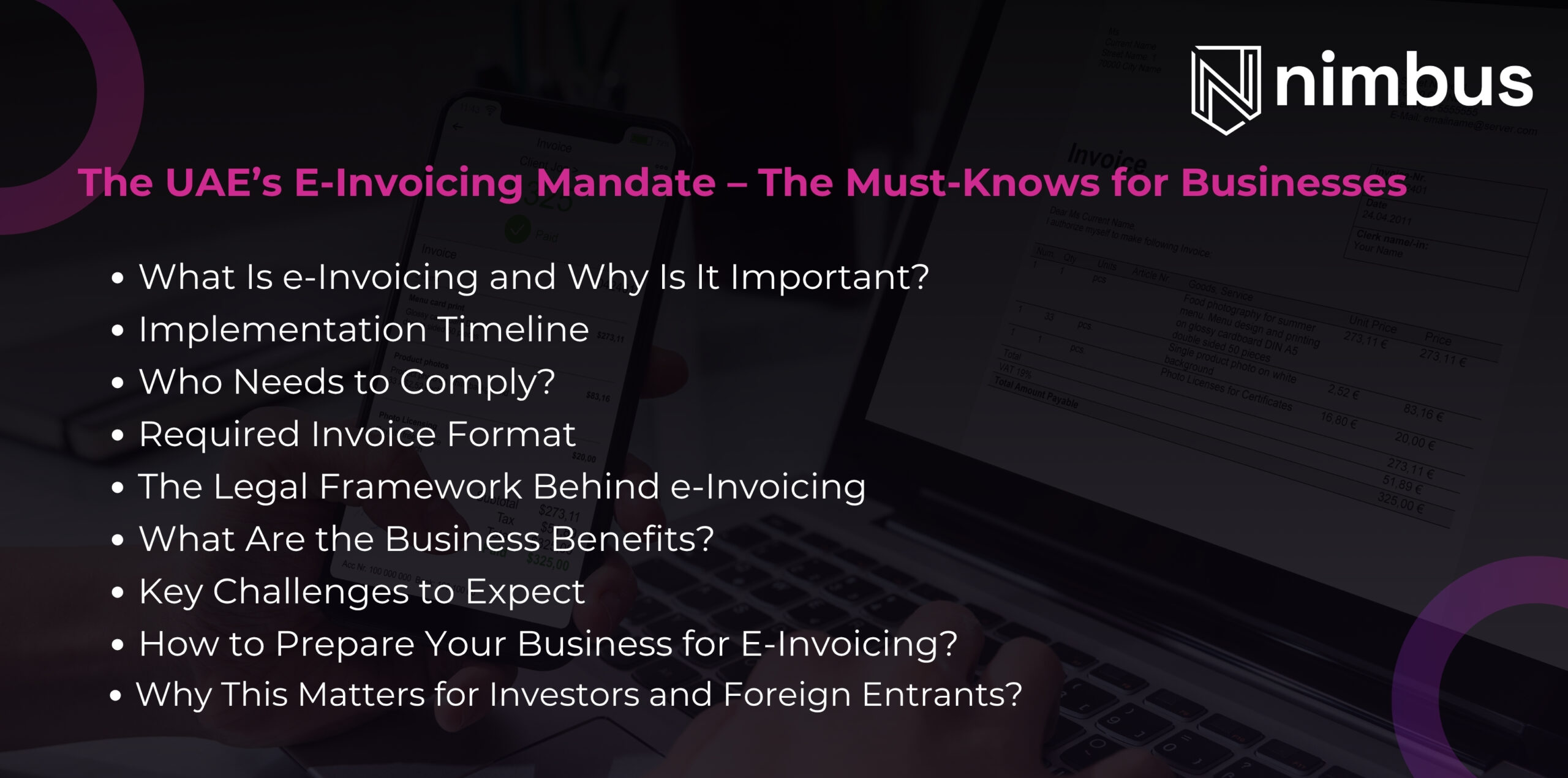The UAE is making bold strides toward digitizing its tax and financial infrastructure, and the mandatory e-invoicing system by July 2026 is one of the most transformative changes yet.
For companies undergoing business setup in the UAE or those already operating, this shift to electronic invoicing under the “E-Billing System” is both a regulatory requirement and a strategic opportunity, and we’ll see how.
While some might view it as just another compliance burden, we believe e-invoicing will define how efficiently businesses operate in the next decade. Here’s why this development matters, how it will impact different stakeholders, and how your business can prepare.
The UAE’s E-Invoicing Mandate – The Must-Knows for Businesses

1. What Is e-Invoicing and Why Is It Important?
E-invoicing is the process of creating, issuing, and storing invoices in a digital format that follows a structured data model. In the UAE, this means generating invoices in formats like XML or JSON and transmitting them through Accredited Service Providers (ASPs) using the Peppol network.
These invoices are received and stored in real-time by the Federal Tax Authority (FTA). Paper-based or manually prepared invoices, like PDFs or scanned copies, will no longer qualify as valid tax documents.
This is a massive shift that forces companies to automate their financial documentation. For entrepreneurs considering UAE business setup, it’s essential to understand that future-ready infrastructure is a necessity.
2. Implementation Timeline
Initially targeted for July 2025, the UAE’s e-invoicing go-live date has now been postponed to July 2026 due to the system’s technical complexity. This extension offers a critical buffer for businesses to adapt, test, and integrate their invoicing systems.
Key milestone:
- February 2024: The Ministry of Finance confirmed that the UAE would adopt the Peppol-based DCTCE (5-corner) model for Continuous Transaction Controls (CTC).
This model streamlines communication among five parties: invoice issuer, invoice receiver, two service providers, and the FTA’s e-Billing platform.
3. Who Needs to Comply?
Eventually, all VAT-registered businesses in the UAE will be required to comply with e-invoicing regulations. This includes businesses involved in both B2B and B2G transactions. Although more detailed scope guidelines are still awaited, the direction is clear: full digitization for all commercial entities.
If you are in the process of company formation in the UAE, ensure your operational roadmap includes e-invoicing capabilities from the outset.
4. Required Invoice Format
To be valid under UAE law, e-invoices must meet the following requirements:
- Must be generated in XML or JSON format
- Must follow structured standards like UBL (Universal Business Language) or PINT (Peppol Invoice Standard)
- Must be transmitted via an Accredited Service Provider using the Peppol network
- Must be submitted to the FTA’s e-Billing system in real time
Manual or semi-digital formats like PDF, Excel, or paper invoices will not be accepted.
5. The Legal Framework Behind e-Invoicing
The UAE government has been laying the legal groundwork for e-invoicing for years:
- The Federal Law No. 1 of 2006 on Electronic Commerce and Transactions gives electronic records, signatures, and communications the same legal validity as traditional methods.
- The FTA’s acceptance of electronic invoicing aligns with the broader digital transformation of government services.
Moreover, with the UAE’s VAT regime introduced in 2018, e-invoicing also strengthens tax transparency and supports more accurate VAT return filing.
6. What Are the Business Benefits?
There’s no question that e-invoicing will require investment, but the benefits are substantial:

- Faster Processing: Real-time invoice submission means quicker payment cycles.
- Reduced Fraud and Errors: Structured data minimizes manipulation and manual entry mistakes.
- Improved Compliance: Integrated systems make it easier to meet tax and legal obligations.
- Better Financial Visibility: Automating invoicing gives businesses real-time insights into cash flow and expenses.
- Global Compatibility: Peppol compliance ensures easier international trade and cross-border invoicing.
This is especially valuable for firms exploring company formation in the UAE to serve international clients.
7. Key Challenges to Expect
Adoption isn’t without hurdles, especially for smaller companies or those relying on legacy systems. Challenges include:
- Real-time system integration with the FTA portal
- Digital signing and validation of invoices
- Infrastructure upgrades and technical onboarding
- Ensuring compliance with both e-invoicing and VAT requirements
For this reason, consulting firms in the UAE are increasingly offering specialized advisory services to help businesses transition smoothly.
8. How to Prepare Your Business for E-Invoicing?
Whether you’re just completing UAE business setup or have been operational for years, follow these steps:
- Understand the Law: Familiarize yourself with UAE’s invoicing standards, VAT rules, and digital signature requirements.
- Assess Your Current System: Determine whether your ERP or accounting software supports real-time, structured invoicing.
- Choose a Trusted ASP: Work with a government-accredited provider like ClearTax to ensure secure, compliant invoice generation.
- Conduct Testing: Run pilot submissions to detect and correct integration issues before the mandate kicks in.
- Train Your Staff: Ensure your finance and operations teams understand the new process.
9. Why This Matters for Investors and Foreign Entrants?
For foreign investors, the e-invoicing requirement adds another layer to consider during company formation in the UAE. It’s no longer enough to register a business and open a bank account. Your financial systems must also meet regulatory standards from day one.
Partnering with the right consulting firms in the UAE like Nimbus Consultancy can give you a competitive edge, helping you avoid fines and positioning your company as a forward-thinking, compliant enterprise.
E-Invoicing Is the Future – Start Preparing Now
The UAE’s push toward mandatory e-invoicing is part of a broader national digital agenda aimed at transparency and global integration. The date might have gotten postponed to July 2026 but now is the time to act.
Waiting until 2026 to start adapting could mean higher costs, rushed integration, and potential compliance issues. Instead, use the available time to implement secure, scalable invoicing systems that prepare your company for the digital future.


